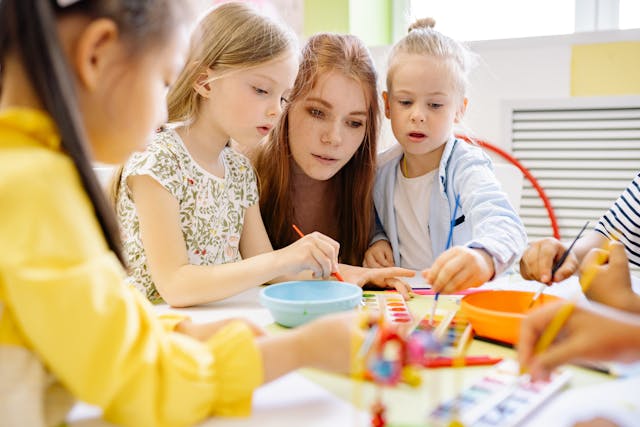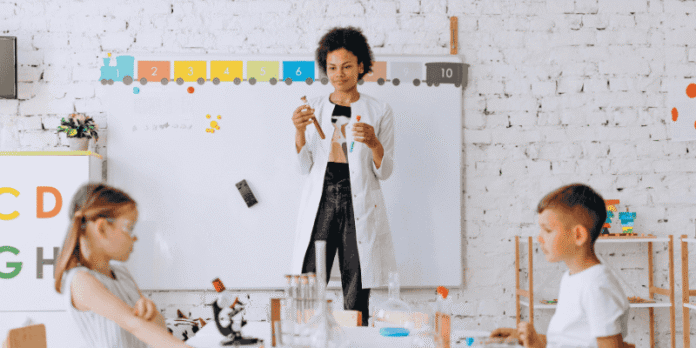Early childhood is one of the most important stages in life. During these years, children begin to learn how to think, feel, and interact with others. This is why early childhood educators play such a big role in shaping how young minds grow.
They help children build the skills they need to succeed, both in school and in life.
Read More:
- What is the most widespread early childhood education program in the United States?
- Unlocking Potential: The Power of Early Childhood Education in Daycare
- Building a Strong Start: How Pre-K Programs Shape Early Learning
The Role of Early Childhood Educators in Child Development
Early educators guide young children through simple, everyday lessons. These experiences help build a strong base for future learning and life skills.
Supporting Early Learning and Growth
Early childhood educators use fun, hands-on methods. They teach language, numbers, problem-solving, and more. Learning often happens through play, arts and crafts, and daily routines.
For example, when children paint, draw, sort shapes, or play counting games, they build brain power. These activities also teach them how to focus, plan, and make choices.
Promoting Social and Emotional Development
Along with learning basic skills, children also learn how to manage emotions. They discover how to express feelings and work well with others.
Early educators teach children how to share toys, wait their turn, and speak kindly. These lessons are taught gently, with patience. By creating a warm and caring learning environment, educators help children feel safe and confident.
Settings Where Early Educators Work

Early educators work in many different places. Each one offers children a chance to grow in a safe and supportive setting.
Child Care Centers and Preschools
In child care centers and preschools, children follow routines that help them feel secure. These routines also prepare them for what comes next.
Preschool teachers plan age-appropriate activities. These include singing songs, reading stories, exploring nature, and more. Over time, these daily tasks teach children how to listen, follow directions, and stay focused. All of this builds a strong foundation before they enter public schools.
For many families, finding a center that offers both structure and flexibility can be challenging. Programs in reputable centers like Kidz Galore offer a balanced approach by combining play-based learning with the support of qualified educators across multiple locations.
Public Schools and Elementary Classrooms
Early educators also work in public schools. They are often found in kindergarten and lower-grade classrooms.
Elementary school teachers and teacher assistants help children adjust to more structured lessons. They guide students from playful learning to early reading, writing, and math.
In special education classrooms, early educators offer extra help. They use specific methods and tools to support children with unique learning needs. Every child gets a chance to grow and succeed.
Cultural and Social Learning Through Early Education
Beyond academic skills, early educators help children learn how to get along with others. They also help children understand the world around them.
Inclusion of Cultural Experiences
Early childhood educators introduce stories, songs, and traditions from many cultures. Children learn about different holidays, foods, and ways of life.
These experiences teach children to respect and value others. They start to see how differences can be interesting and fun. When kids learn about different cultures early on, they grow up more open-minded and understanding.
Encouraging Group Interaction
Group activities are a big part of early childhood education. Children play games, sing songs, and interact with their peers to work together on simple projects.
These moments help children learn how to take turns, listen to others, and solve problems as a team. Group work also helps them build friendships. These social skills stay with them for years to come.
Training and Qualifications of Early Childhood Educators
To do their job well, early educators need proper training. They also need to keep learning throughout their careers.
Pathways to Becoming an Early Educator
Most early educators study child development before they start working. Some earn a Child Development Associate (CDA) credential. Others complete degrees in early childhood education.
Preschool teachers and child care staff often take extra courses. These help them understand how to support young children in different situations.
In public schools, elementary school teachers usually need a bachelor’s degree and a teaching license. Teacher assistants may need a two-year degree or other certifications, depending on the school.
Ongoing Professional Development
Learning doesn’t stop after getting hired. Early educators often attend workshops or training sessions. These focus on behavior support, classroom safety, or new teaching ideas.
Even experienced teachers benefit from regular training. It helps them stay up to date and continue giving children the best care and guidance possible.
Conclusion
Early childhood educators shape how kids grow, think, and connect with others. They work in child care centers, public schools, and special education classrooms. No matter where they are, these professionals build safe and meaningful learning environments.
With the right training and support, early educators continue making a lasting impact, one child at a time.


Beautifully written! Early childhood educators truly play a powerful role in shaping little minds. Their patience, creativity, and guidance lay the foundation for a lifetime of learning. This blog perfectly captures their impact.